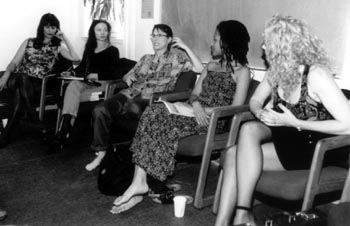
Greg Roden
Adventurers in the Skin Trade: Six sex-industry workers and one witch give encouraging advice to a small crowd of strippers on how to break into the old boys' network of publishing.
A writing conference coaches strippers on turning their sex-work experience into a career in publishing
By Krista Loynachan
A beautiful young blonde wants to make it in showbiz, but instead she finds herself caught up in the sleazy world of lap dancing. Soon her life is falling apart, but she makes lots of money and manages to turn us on while we follow her tortured adventures on the strip club circuit, playing the voyeur from the comfort of our homes as we watch her dance naked on the screen or read about her tales of dressing-room bonding.
Sound familiar? Scenarios like these are all too familiar to some local writers trying to publish writings about the sex industry. Given the recent memoir boom and the selling power of sex, it would seem that women in the sex industry should be able to make a viable living in recounting their experiences. But the message at a recent writer's workshop sponsored by the Erotic Dancer's Alliance in San Francisco was that there are still old-fashioned obstacles to women who want to write about sex on their own terms. The speakers, "six women sex-industry workers and one witch," spoke of the difficulties in getting their voices heard, but they also gave encouraging advice to a small crowd of sex workers on how to break into the old boys' network of publishing.
The panel was as diverse as the many workers that make up the sex industry, from college graduates to women who have had little, if any, postsecondary education. Their positions within the sex industry were likewise varied: a dancer at the unionized, women-positive Lusty Lady, a lesbian ex-prostitute, a working call girl, a veteran go-go dancer and the one nonindustry worker, goddess-feminist Francesca DeGrandis, the "witch." Some were sex-work-positive; others were not. But each had encountered difficulties in publishing from her own perspective. Some had editors who asked them to make their tales more titillating; others' stories were rejected when they wrote about themselves as empowered instead of victimized.
Some of the problems sex-industry workers experience are the fears shared by all writers. Am I good enough? Do I have anything to say? But Jill Nagle, the editor of Whores and Other Feminists, an anthology of writings by women in the sex industry, says that these particular writers face the additional problem of the delegitimization of sex workers' and women's experiences. "Try getting an agent to take a working call girl seriously," says panelist Veronica Monet. Monet, who saw herself as a writer long before she was a sex-industry worker, was a contributor to Nagle's anthology and has been published in various magazines, including Black Sheets and Whorezine. She adds that "rejection letters about very personal things" that sex-industry workers are frequently concerned with--sexuality, addiction, rape, molestation--can be heartbreaking.
But not being taken seriously is just the beginning. "If you are sex-positive, women editors will be like, 'Get this thing away from me!' " Monet says. Carol Queen, author of the forthcoming book The Leather Daddy and the Femme, concurs. "There's a lot of pressure about pitching ourselves as victims or titillators, even though we might want to come from a more grounded, serious perspective."
So how do these women get their work published despite the barriers? Their message was one of self-empowerment, of finding back doors, of sticking to your guns and not compromising, even if integrity isn't lucrative. "It's better to write what you want to write and get no money for it than to have your stuff sliced and diced," Queen says. Queen has focused mainly on getting her work published in zines, where she generally has total creative control and is able to write about cultural and political issues that are important to her.
All of the writers stressed the importance of finding an editor or agent who would go to bat for them and properly represent them, rather than try to manipulate them into writing from a different perspective. Nagle advises using "back doors, new angles and self-publishing." Shay Stephen did just that when she self-published her book, The Naked Eye: A Slice of Life Unpeeled, after battling agents, editors and publishers over how her story would be told. But this is only the first step for Stephen--now that her book, which details how exotic dancing has affected her life, has sold out its first run, she's going to resubmit it to major publishing houses along with her sales figures.
Panelist Siobhan Brooks says that for now she writes in what she calls a "male, linear, theoretical voice," in order to get her work published in the academic arena. She approaches sex-industry topics as labor studies and has been published in Z magazine and Third Force. She is currently writing about people of color in the sex industry. Brooks took advantage of her position at the Lusty Lady when it became the nation's only unionized strip club last year by publishing two firsthand accounts of the strippers' labor struggles.
Perseverance, control and self-respect were the recurring themes of the conference. By utilizing these strengths, six sex-industry workers/ writers and one witch have found that having their true voices heard goes hand in hand with empowerment. "Perception is where power is derived," Stephen says, "and I wrote this book to get out my perception."
[ San Francisco | MetroActive Central | Archives ]
![[MetroActive Books]](/books/gifs/books468.gif)